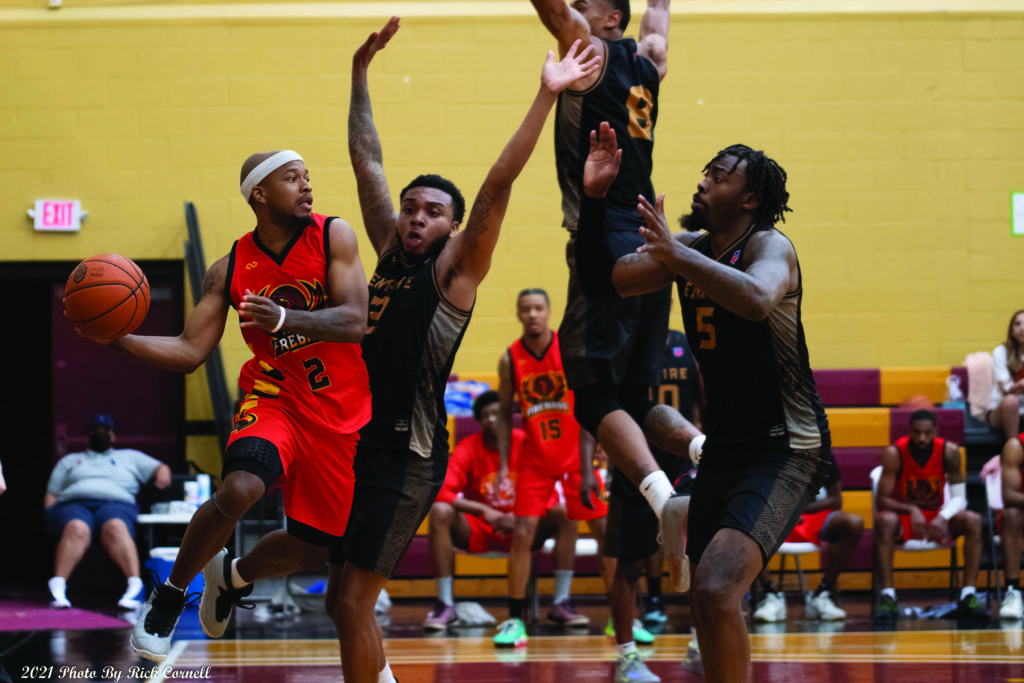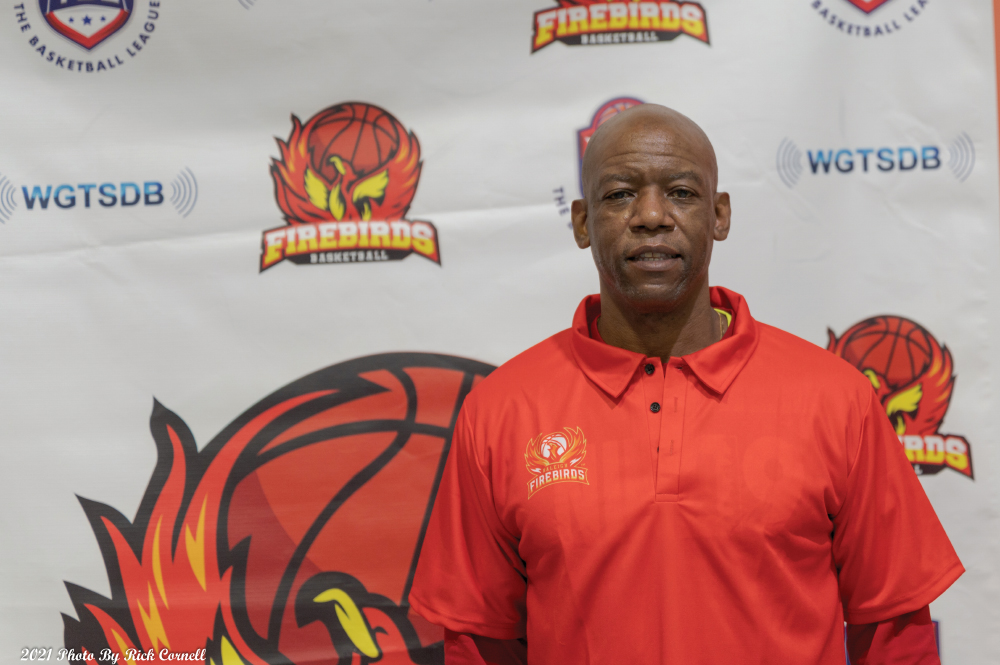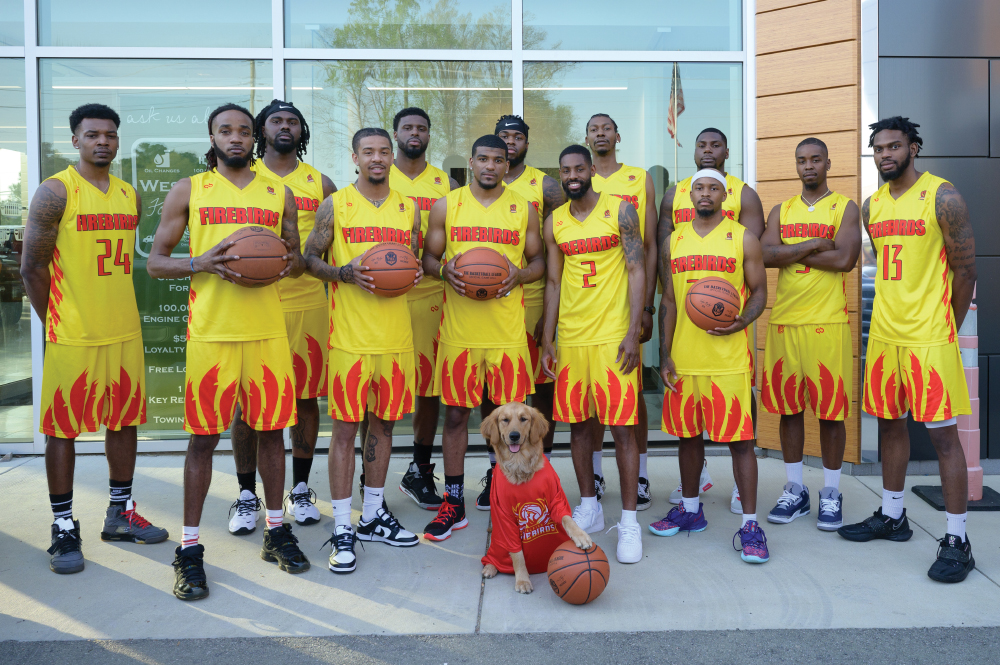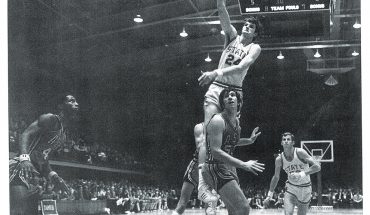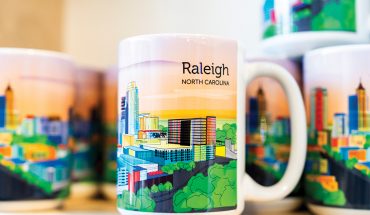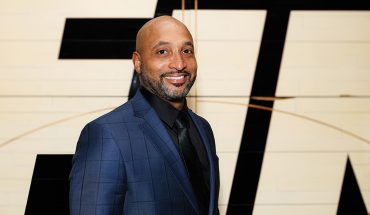The Firebirds offer a new brand of professional basketball in Raleigh, one that fuses competition and community.
by Lori D. R. Wiggins
For more than a decade, Wade Harris has provided academic and athletic mentoring to pre-teen and teen boys at his Raleigh Personal Training Center, a fitness center in north Raleigh. Along the way, he combined his passion for helping young men and his love of basketball by sponsoring a southeast Raleigh team for summer league games hosted in the Saint Augustine’s University gymnasium.
Frequently, Harris found himself working with young men — many of whom enjoyed some glimpses of stardom at collegiate and semi-professional levels — who dreamed of staying in the paint professionally.
In 2017, Harris’ business, Pro Basketball Raleigh, LLC, purchased rights to own a professional basketball team in Raleigh, and two years later he joined the one-year-old The Basketball League (TBL) as Team Market Owner of the Raleigh Firebirds. “With so much talent here and so many players looking to continue to play basketball, it made sense to establish a team in Raleigh,” Harris says.
TBL is the brainchild of Evelyn Magley. As the wife of a college player turned NBA pro, Magley “got an education on the business of basketball, looking at it from the outside, then seeing it from the inside,” she says. “And when I saw the inside, I saw the inside; the behind-the-scenes you don’t see when you’re not part of that world.” She was concerned about the way the athletes were treated, practices that reduced them to performers and commodities.
“There was a lot of ugly,” she says, “players expected to sell their souls.” So she started her own league — the first African-American woman to own a male professional sports league — with the goal of creating more opportunities for professional play and treating players better. “We want to establish a legacy for these young men to live out their dreams, and show them they’re not just athletes, they’re men — whole people,” she says. “It’s a paradigm shift.”
TBL isn’t affiliated with the NBA, or its minor league, the G League (though its players have gone on to these, as well as international teams). But it pays its players, enlists a team chaplain, and offers financial literacy seminars, life-skills classes, and profit-sharing opportunities for both players and Team Market Owners (a nomenclature intended to erase connotations of owning athletes or people). Players can sell their jerseys, for example, and get a percentage of the proceeds. “We’re using basketball as a tool to go out and positively impact lives,” said Magley. “It’s awesome to have that championship trophy, but the real trophies are the lives you impact.”
The Firebirds’ home court is John Chavis Memorial Park, itself a centerpiece of storied history and recent revitalization. “We wanted to serve in the southeast Raleigh corridor so we could offer programs to kids in that community,” Harris says. Here, the Firebirds play about two dozen games a year. The 2022 season kicks off March 4 and continues through May 20, and often the games are supplemented with themes and contests tailored to attract and serve different fans. In the past, they’ve celebrated first responders, the military, STEM education, and local chambers of commerce.
“Wade’s offering men an opportunity to play basketball and be positive role models in the community,” said Sandra Orsega, North Carolina sales manager for PIVOT, a physical-therapy company that sponsors the team.
In its first year of competition, the Firebirds were one of eight TBL teams; they made the playoffs but lost by four points in the Eastern Conference Championship game to the Albany (New York) Patroons, that year’s national champs. The Firebirds’ second season, 2020, was cut in half by the pandemic. By 2021, TBL had grown to 29 teams; that year, the Firebirds lost the first-round playoff to the Syracuse Stallions. Still, Harris notes: “In both full seasons, the Firebirds made the playoffs, which is a big feat!”
This year, there are 47 TBL teams across the United States. The Firebirds recruit from colleges, summer and semi-pro leagues, national TBL combines, and through its own mini-camps. Each year, the recruitment roster is cut from 37 players to 22, then down to 18 players who participate in training camp. In late February, the final 12-man roster is announced. Last year’s roster featured nine North Carolinians. In 2019, five Firebirds players signed contracts to play abroad. Among 2021 players, leading scorer Shaq Dance left to play in Iraq in January; Tony Farmer signed and played in Argentina; and four other Firebirds were invited to combines hosted by the G League.
While still new to the area, “this league is going to be an attraction,” said Chris Lightner, a former TBL and Firebirds player turned assistant general manager. Lightner’s bloodline matches the team’s foundation: He’s the grandson of Raleigh’s first Black mayor and community stalwart, Clarence Lightner, and the son of former North Carolina State University and NBA standout Chris Washburn. “Right here in the Capital City, it gives people something to gravitate towards, and we’re getting better and better, in play and in the things we do off the court out in the community,” he says.
Before this season started, the Firebirds started scrimmages at Chavis on first Tuesdays and Thursdays, hosted a financial literacy and entrepreneurship seminar, and cheered on its “adopted” basketball team at Southeast Raleigh Charter School.
“It’s not just about the team, it’s about being involved in the community in the right way,” said Bob MacKinnon, the Firebirds’ interim head coach. He’s a former assistant coach at UNC-Chapel Hill who was later named the winningest NBA G League coach. He’s filling in for regular Firebirds head coach Robert Brickey, a former Duke University basketball standout, while he takes caution during COVID as a caregiver to aging parents. “The Firebirds are an integral part of this growing league,” MacKinnon says. “It’s a great brand of basketball in this great basketball state we live in.”
Firebirds point guard Brock Young, a Broughton High School and East Carolina University alumnus, credits Harris for getting him in shape mentally and physically to return to the sport after enduring five potentially career-ending injuries. “Wade is a blessing,” he says. “He’s the reason a lot of guys are in a good place now, despite the obstacles that got in the way.”
__
This article originally appeared in the March 2022 issue of WALTER Magazine.

